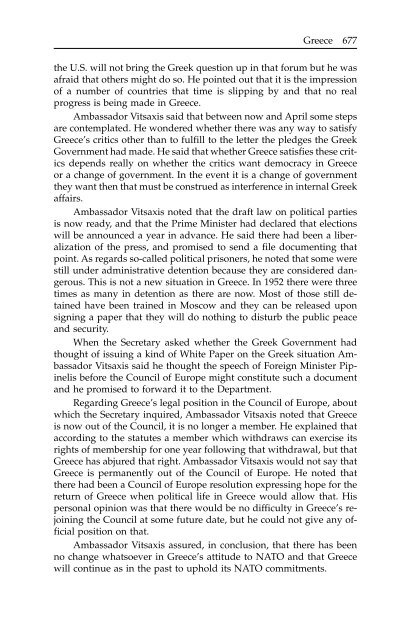Greece - US Department of State
Greece - US Department of State
Greece - US Department of State
Create successful ePaper yourself
Turn your PDF publications into a flip-book with our unique Google optimized e-Paper software.
<strong>Greece</strong> 677<br />
the U.S. will not bring the Greek question up in that forum but he was<br />
afraid that others might do so. He pointed out that it is the impression<br />
<strong>of</strong> a number <strong>of</strong> countries that time is slipping by and that no real<br />
progress is being made in <strong>Greece</strong>.<br />
Ambassador Vitsaxis said that between now and April some steps<br />
are contemplated. He wondered whether there was any way to satisfy<br />
<strong>Greece</strong>’s critics other than to fulfill to the letter the pledges the Greek<br />
Government had made. He said that whether <strong>Greece</strong> satisfies these critics<br />
depends really on whether the critics want democracy in <strong>Greece</strong><br />
or a change <strong>of</strong> government. In the event it is a change <strong>of</strong> government<br />
they want then that must be construed as interference in internal Greek<br />
affairs.<br />
Ambassador Vitsaxis noted that the draft law on political parties<br />
is now ready, and that the Prime Minister had declared that elections<br />
will be announced a year in advance. He said there had been a liberalization<br />
<strong>of</strong> the press, and promised to send a file documenting that<br />
point. As regards so-called political prisoners, he noted that some were<br />
still under administrative detention because they are considered dangerous.<br />
This is not a new situation in <strong>Greece</strong>. In 1952 there were three<br />
times as many in detention as there are now. Most <strong>of</strong> those still detained<br />
have been trained in Moscow and they can be released upon<br />
signing a paper that they will do nothing to disturb the public peace<br />
and security.<br />
When the Secretary asked whether the Greek Government had<br />
thought <strong>of</strong> issuing a kind <strong>of</strong> White Paper on the Greek situation Ambassador<br />
Vitsaxis said he thought the speech <strong>of</strong> Foreign Minister Pipinelis<br />
before the Council <strong>of</strong> Europe might constitute such a document<br />
and he promised to forward it to the <strong>Department</strong>.<br />
Regarding <strong>Greece</strong>’s legal position in the Council <strong>of</strong> Europe, about<br />
which the Secretary inquired, Ambassador Vitsaxis noted that <strong>Greece</strong><br />
is now out <strong>of</strong> the Council, it is no longer a member. He explained that<br />
according to the statutes a member which withdraws can exercise its<br />
rights <strong>of</strong> membership for one year following that withdrawal, but that<br />
<strong>Greece</strong> has abjured that right. Ambassador Vitsaxis would not say that<br />
<strong>Greece</strong> is permanently out <strong>of</strong> the Council <strong>of</strong> Europe. He noted that<br />
there had been a Council <strong>of</strong> Europe resolution expressing hope for the<br />
return <strong>of</strong> <strong>Greece</strong> when political life in <strong>Greece</strong> would allow that. His<br />
personal opinion was that there would be no difficulty in <strong>Greece</strong>’s rejoining<br />
the Council at some future date, but he could not give any <strong>of</strong>ficial<br />
position on that.<br />
Ambassador Vitsaxis assured, in conclusion, that there has been<br />
no change whatsoever in <strong>Greece</strong>’s attitude to NATO and that <strong>Greece</strong><br />
will continue as in the past to uphold its NATO commitments.
















